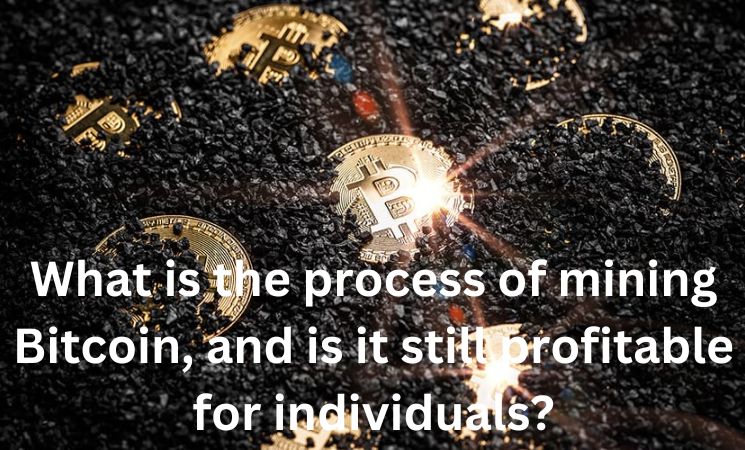Cryptocurrencies have become a significant player in the financial world, with Bitcoin leading the pack. One of the fundamental aspects of Bitcoin is its creation through a process known as mining. In this article, we will delve into the process of mining Bitcoin and explore whether it is still profitable for individuals.
What is Bitcoin?
Bitcoin is a decentralized digital currency that operates on a blockchain technology. It was created in 2009 by an anonymous entity known as Satoshi Nakamoto. Unlike traditional currencies, Bitcoin is not controlled by any central authority, like a government or a bank. Instead, it relies on a distributed ledger system, where transactions are verified by a network of computers, or “miners.” This technology ensures transparency, security, and immutability of transactions. Bitcoin can be used for various online and offline transactions and has gained popularity as a store of value, akin to digital gold, due to its limited supply and potential for long-term investment.
What is Bitcoin Mining?
Bitcoin mining is the process by which new bitcoins are created and transactions on the Bitcoin network are verified and added to the blockchain. Miners use powerful computers to solve complex mathematical puzzles, and when they successfully solve a puzzle, they are rewarded with newly minted bitcoins. This process is also essential for securing the network and preventing double-spending. Mining requires significant computational power and energy, as well as specialized hardware. As more miners participate, the puzzles become harder to solve, making it a competitive and resource-intensive endeavor. While it was once profitable for individuals, the increasing difficulty and energy costs have made it more challenging in recent years.
What Is Mining Process?
Bitcoin mining involves several key aspects, including the creation of new blocks, the concept of Proof of Work, and the use of mining pools.
Creating New Blocks
Miners aim to create new blocks on the Bitcoin blockchain. These blocks contain a list of recent transactions waiting to be confirmed. To do this, miners must compete to solve a complex mathematical puzzle, known as the Proof of Work.
Proof of Work
Proof of Work (PoW) is a crucial component of Bitcoin mining. Miners must find a specific numerical value, or “nonce,” through trial and error, which, when combined with the block’s data, results in a hash (a unique code) that meets certain criteria. This PoW process ensures that mining is resource-intensive, time-consuming, and requires substantial computational power, making it challenging for any single entity to control the network.
Mining Pools
Given the high level of competition and the increasing difficulty of mining, individual miners often join mining pools. These pools consist of multiple miners who combine their computational resources and share the rewards based on their contributions. Pooling resources increases the chances of successfully mining a new block and receiving a portion of the newly created bitcoins, providing a more consistent income stream for participants.
Is Bitcoin Mining Profitable for Individuals?
Factors Affecting Profitability
- Bitcoin Price: The most significant factor is the price of Bitcoin. As the value of one Bitcoin rises, mining becomes more profitable, as the rewards are worth more.
- Mining Difficulty: Bitcoin’s network adjusts its difficulty regularly to maintain a consistent block creation time. Higher difficulty levels make mining less profitable for individuals.
- Mining Hardware: The type and quality of mining hardware used can greatly impact profitability. High-performance hardware is more efficient but also more expensive.
- Electricity Costs: Mining requires a significant amount of electricity. Areas with lower electricity rates are more favorable for mining operations.
- Maintenance and Cooling: Hardware maintenance and cooling solutions can add to the overall costs of mining.
Potential Costs
Bitcoin mining can incur several costs, including the purchase of mining equipment, electricity expenses, and ongoing maintenance. It’s essential to consider these costs against potential rewards to assess profitability accurately.
Environmental Impact
Bitcoin mining has faced scrutiny due to its environmental impact. The energy-intensive Proof of Work process has led to concerns about carbon emissions and electricity consumption. Some miners are exploring more energy-efficient alternatives, such as renewable energy sources, to mitigate this impact. The environmental aspect should be considered when evaluating the profitability of Bitcoin mining, especially in regions with strict environmental regulations and rising energy costs.
What Are the Challenges in Bitcoin Mining?
- Intense Competition: The increasing number of miners and mining pools has made the competition fierce, reducing the likelihood of individual miners solving blocks and earning rewards.
- High Energy Consumption: The Proof of Work consensus mechanism consumes a significant amount of electricity, leading to higher operational costs and environmental concerns.
- Mining Hardware Costs: High-performance mining hardware is expensive and requires regular upgrades to remain competitive.
- Technical Expertise: Setting up and maintaining mining equipment can be technically complex, requiring expertise in computer hardware and software.
- Regulatory Issues: The legal and regulatory environment for cryptocurrency mining varies by country and is subject to change, creating uncertainty for miners.
- Volatility: Bitcoin’s price can be highly volatile, impacting the profitability of mining operations. A drop in price can affect mining rewards significantly.
How The Future of Bitcoin Mining Will Be?
- Energy Efficiency: To address environmental concerns, miners are exploring more energy-efficient mining methods, such as renewable energy sources and greener technologies.
- Regulatory Clarity: The regulatory landscape for cryptocurrency mining is expected to become clearer in various regions, impacting the location and legality of mining operations.
- Technological Advancements: Continued development of mining hardware and software will increase efficiency and potentially extend the profitability of mining.
- Layer 2 Solutions: The implementation of Layer 2 scaling solutions, like the Lightning Network, can improve transaction speed and reduce fees, potentially enhancing mining profitability.
- Security Enhancements: Ongoing efforts to enhance network security and protect against potential attacks will be crucial for the stability and trustworthiness of Bitcoin.
- Market Maturity: As Bitcoin becomes more mainstream, its price may stabilize, potentially providing a more predictable and less volatile mining environment.
Conclusion
In conclusion, Bitcoin mining is a multifaceted endeavor with both opportunities and challenges. While it has been a lucrative pursuit for some, the landscape is evolving rapidly. The future of Bitcoin mining hinges on advancements in technology, environmental responsibility, regulatory developments, and market dynamics. Individuals considering mining should carefully assess these factors to make informed decisions. As the cryptocurrency space continues to mature, adaptability and a keen understanding of the evolving terrain will be vital for those seeking profitability in Bitcoin mining.
FAQs
- What is Bitcoin mining?
- Bitcoin mining is the process of validating transactions and creating new blocks on the Bitcoin blockchain using computational power.
- How do I start mining Bitcoin?
- To start mining Bitcoin, you’ll need specialized mining hardware, software, and access to the internet. Joining a mining pool is also a common approach.
- What is the role of miners in the Bitcoin network?
- Miners secure the network by verifying transactions and adding them to the blockchain. They also create new bitcoins as a reward for their efforts.
- Is Bitcoin mining profitable for individuals?
- Profitability depends on various factors, including electricity costs, hardware, and Bitcoin’s price. It may be profitable, but it’s also highly competitive.
- What is Proof of Work (PoW)?
- PoW is the consensus mechanism used in Bitcoin mining. Miners solve complex mathematical puzzles to validate transactions and secure the network.
- What’s the environmental impact of Bitcoin mining?
- Bitcoin mining’s energy consumption is a concern, but some miners use renewable energy sources to mitigate the environmental impact.
- Are there alternatives to Bitcoin mining?
- Yes, there are alternative cryptocurrencies and mining methods, such as Proof of Stake, which require less energy.
- What are the costs involved in Bitcoin mining?
- Costs include hardware, electricity, maintenance, and cooling. The total cost depends on the scale of your mining operation.
- Can I mine Bitcoin on a regular computer?
- Bitcoin mining now requires specialized hardware called ASICs, making it unfeasible on regular computers.
- How often are new bitcoins created through mining?
- New bitcoins are created approximately every ten minutes when a new block is added to the blockchain.








